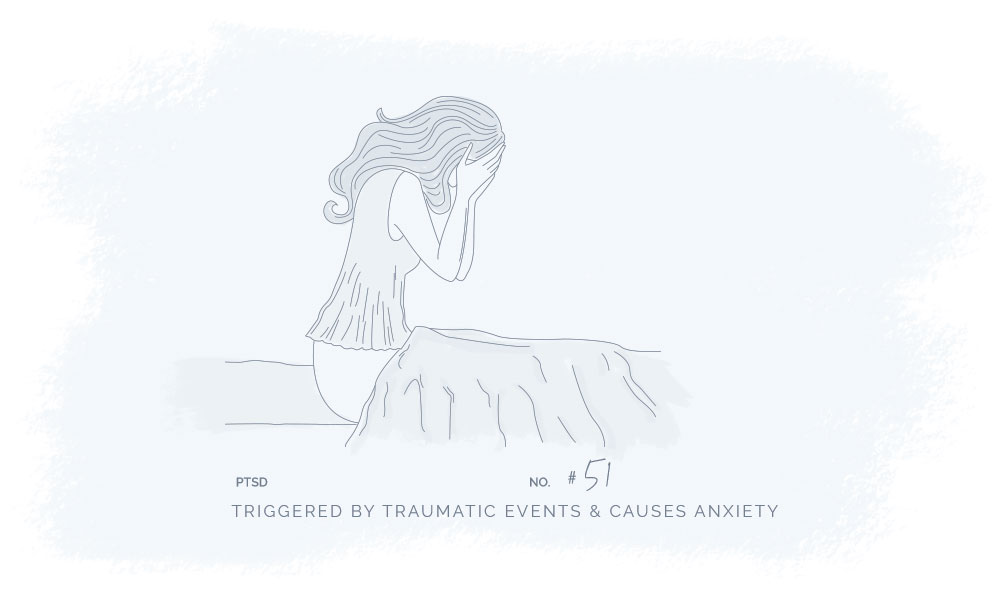Psoriasis
Category
Behavioral
REVIEWED BY
Our Biomedical Scientist
Reviewed based on
Literature Review
Last update
December 2020

What is PTSD
Post-traumatic stress disorder (PTSD) is a mental disorder that is caused by a traumatic event that can lead to various symptoms such as severe anxiety, flashbacks, and nightmares. These symptoms may interfere with many aspects of life.1
Symptoms
The occurrence of PTSD symptoms can vary greatly between people. The symptoms sometimes start very quickly after the traumatic event (within four weeks) but in other cases, they may not appear until years after a traumatic experience. However, when the symptoms do appear, they may interfere with daily activities, social interaction, and work. In general, PTSD symptoms can be categorized into four distinct types:1
- Intrusive memories
Examples: flashbacks e.g. reliving the traumatic event, nightmares, unwanted and distressing memories - Avoidance
Examples: Avoid any places, people, activities that resemble the traumatic event and/or avoid thinking or discussing the event - Negative changes in thinking and mood
Examples: Negative thoughts regarding yourself, other people, the world, and the future - Changes in physical and emotional reactions
Examples: Difficulty sleeping, concentrating, being easily frightened, constant guard for danger, and self-destructive behavior
Cause
Currently, the exact cause of PTSD is not known, however, experienced or witnessed traumatic events such as military service, abuse (violence, sexual, etc.), assault, accidents, and threats can trigger the disorder. People can also be likely to develop PTSD due to genetics (family history, anxiety, depression, or temperament) or how the brain regulates chemicals/hormones in the body.1
The connection between Cannabinoids & PTSD
Studies find that CBD and THC may have great therapeutic potential and may be used to help treat PTSD. CBD and THC are well-known cannabinoids, however, they do not have the same psychoactive effects. THC is psychoactive while CBD does not possess psychoactive effects. According to WHO guidelines, the cannabidiol CBD is generally well tolerated with a good safety profile.
Clinical research proposes that the cannabinoids THC and CBD may be beneficial in the treatment of PTSD patients as they may help improve their symptoms.2
In addition, preliminary studies in humans propose that cannabinoids may help reduce and improve several PTSD symptoms such as sleep quality, nightmares, hyperarousal, and prevent the development of PTSD if cannabinoids are administered shortly after a traumatic event.3
The literature discussion is an overview of the published results from scientific studies investigating if and how cannabinoids can be beneficial in the treatment of PTSD. The overview will be updated regularly to ensure the newest and most accurate information.
THC and CBD may have beneficial properties for PTSD
There is a connection between cannabis use and PTSD, suggesting that this may be used as a coping strategy for PTSD.4,5,6,7,8
In rats, extinction of fear memories was facilitated by CBD, THC and synthetic cannabinoids.9
CBD has demonstrated to produce a positive effect on sleep processes, suggesting that this can be beneficial when targeting sleep disorders connected to PTSD.10
In a pilot study, PTSD-related nightmares and other symptoms severity were reduced by THC in patients with PTSD.11
In a retrospective study of 80 patients with PTSD, PTSD-related symptoms were reduced by cannabis.12
Clinical trials are research studies that examine new treatments and evaluate their effects on human health outcomes.
Cannabinoids appear to relief PTSD symptoms
Fear extinction was shown to be facilitated by CBD and THC, proposing that cannabinoids may contribute to preventing the recovery of fear.13
In one open clinical trial, significant relief of PTSD symptoms was provided by cannabis in most patients.14
- https://www.mayoclinic.org/diseases-conditions/post-traumatic-stress-disorder/symptoms-causes/syc-20355967
- https://ghmedical.com/endocannabinoid-system/diseases/ptsd
- Zer-Aviv, T., Et Al., (2016). ” Cannabinoids and post-traumatic stress disorder: clinical and preclinical evidence for treatment and prevention”. https://pubmed.ncbi.nlm.nih.gov/27551883/
- Bonn-Miller, M. O., Et Al., (2010). ” Sleep Problems and PTSD Symptoms Interact to Predict Marijuana Use Coping Motives: A Preliminary Investigation”. https://www.tandfonline.com/doi/abs/10.1080/15504261003751887
- Bonn-Miller, M. O., Et Al., (2007). ” Posttraumatic stress symptom severity predicts marijuana use coping motives among traumatic event-exposed marijuana users”. https://onlinelibrary.wiley.com/doi/abs/10.1002/jts.20243
- Bujarski, S. J., Et Al., (2012). ” Marijuana use among traumatic event-exposed adolescents: Posttraumatic stress symptom frequency predicts coping motivations for use”. https://www.sciencedirect.com/science/article/abs/pii/S0306460311002826?via%3Dihub
- Cougle, J. R., Et Al., (2011). ”Posttraumatic stress disorder and cannabis use in a nationally representative sample”. https://doi.apa.org/doiLanding?doi=10.1037%2Fa0023076
- Kevorkian, S., Et Al., (2015). “Associations among trauma, posttraumatic stress disorder, cannabis use, and cannabis use disorder in a nationally representative epidemiologic sample”. https://doi.apa.org/doiLanding?doi=10.1037%2Fadb0000110
- Bitencourt, R. M., Et Al., (2008). ” Facilitation of contextual fear memory extinction and anti-anxiogenic effects of AM404 and cannabidiol in conditioned rats”. https://www.sciencedirect.com/science/article/abs/pii/S0924977X08001727?via%3Dihub
- Chagas, M. H. N., Et Al., (2013). ”Effects of acute systemic administration of cannabidiol on sleep-wake cycle in rats”. https://journals.sagepub.com/doi/10.1177/0269881112474524
- Roitman, P., Et Al., (2014). “Preliminary, Open-Label, Pilot Study of Add-On Oral Δ9-Tetrahydrocannabinol in Chronic Post-Traumatic Stress Disorder”. https://link.springer.com/article/10.1007%2Fs40261-014-0212-3
- Greer, G. R., Et Al., (2014). ”PTSD Symptom Reports of Patients Evaluated for the New Mexico Medical Cannabis Program”. https://www.tandfonline.com/doi/abs/10.1080/02791072.2013.873843
- Das, R.K., Et Al., (2013). “Cannabidiol enhances consolidation of explicit fear extinction in humans”. https://pubmed.ncbi.nlm.nih.gov/23307069/
- http://www.cannabis-med.org/studies/ww_en_db_study_show.php?s_id=481&&search_pattern=posttraumatic
CANNABINOIDS & RECEPTORS
Below you find the plant cannabinoids, cannabinoid receptors, and endocannabinoids that are associated with the potential therapy.
If you have any further information relevant to the connection between PTSD and cannabinoids or find any of the information inaccurate, outdated or incomplete please contact us here.

